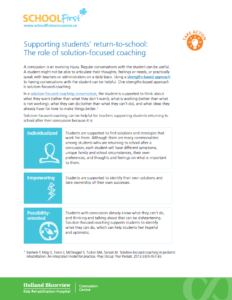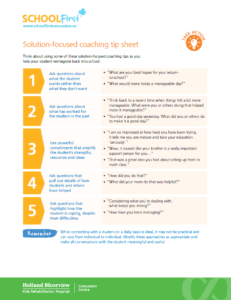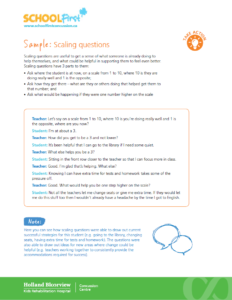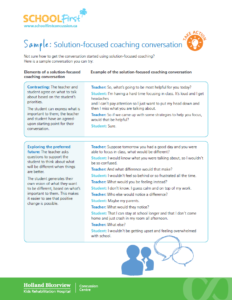Engage and empower teachers and staff
- Teachers are critical facilitators and evaluators of student reintegration. They observe students on a daily basis, check-in informally with students about workload and symptoms, and often meet with the appropriate members of the student support team to discuss and plan for appropriate school activity and supports for the student throughout their recovery after a concussion.
- It is important for teachers to have access to ongoing concussion education opportunities. This will allow them to:
- engage in ongoing professional learning to help strengthen their role as a Concussion Champion
- share their knowledge with students to help them become more aware of what it means to have a concussion and the impact on life
- integrate their concussion knowledge into curriculum across grades and subject areas
- Designing and implementing appropriate teaching and assessment strategies that correspond with students’ stage of concussion recovery is essential and will foster a supported reintegration process.
- Collaborating and communicating is key to ensuring school team support and coordination.
- Using a strengths-based approach to guide conversations can empower teachers and staff to optimally support students following a concussion.
What is a strengths-based approach?
Strengths-based approaches focus on an individual’s strengths rather than deficits. Emphasis is placed on looking for solutions and resources, and focusing on what is working rather than what needs to be ‘fixed’ or what is not working.7
Find out how to support students using solution-focused coaching, an example of a strengths based approach.
Try this
Not sure how to get the conversation started using solution-focused coaching?
Think about using some of these solution-focused coaching tips as you help your student reintegrate back into school.
For example:
- Ask questions about what the student wants rather than what they don’t want
- “What are your best hopes for your return-to-school?”
- “What would make today a manageable day?”
Check out this tip sheet to see the full list of coaching tips!
Scaling questions
Scaling questions are useful to get a sense of what someone is already doing to help themselves, and what could be helpful in supporting them to feel even better. Scaling questions have 3 parts to them:
- Ask where the student is at now, on a scale from 1 to 10, where 10 is they are doing really well and 1 is the opposite;
- Ask how they got there – what are they or others doing that helped get them to that number; and
- Ask what would be happening if they were one number higher on the scale
Learn more about scaling questions and how they can be used to help students with a concussion.
Ready to get started? Here is a sample conversation you can try.




